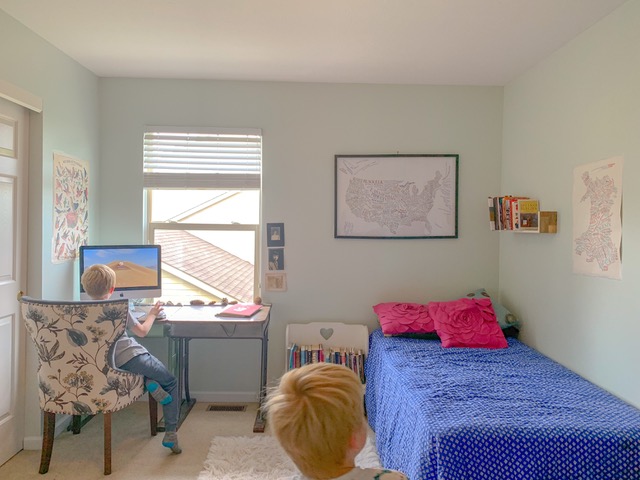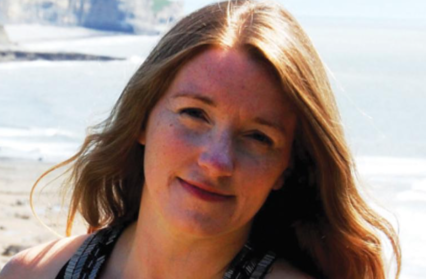For the latest in our Writers’ Rooms series, poet, essayist and academic Zoë Brigley invites us into her workspace in her home in Ohio. Brigley’s books can be found at Bloodaxe Books.

When I was asked to write up something about the room I work in, initially it seemed simple enough. I’ve read other writers’ accounts in the “Writers’ Rooms” feature for Wales Arts Review, and I have been intrigued by the insights into how they work, but when I came to take a photograph, I began to feel a bit defensive. I felt defensive because the room I work in does not look like an academic office, or a high-powered writing room, or even a romantic writing shed: it’s just a space in a family house, and sometimes it is inhabited by children too.
I could have taken a picture of my office at the Ohio State University: books piled up, cabinets, desks etc., but honestly, that is not where I do most of my creative writing. Instead I am most productive at home. This is where the defensiveness comes in, because I cannot be at home without my children, and signs of them appear around the house, no matter how much one might to tidy them away. I wondered, did I really want to open up this space to outsiders and be judged?
Because people do judge, and motherhood is seldom taken as a state from which someone can be a great writer. I have written before about Kim Brooks’ 2018 article for The Cut, ‘A Portrait of the Artist as a Young Mom,’ but it springs to mind again, because at the beginning is a moment of judging parenthood. Brooks describes how, as a student at the Iowa Writers’ Workshop, she was one of a group invited to a professor’s house. She describes the professor’s children behaving riotously, his wife “beautiful and exhausted,” while one student complains: “It smells like milk.” Brooks concludes that she “knew I’d never see my teacher in quite the same way again.” I tend to wonder what is wrong with the students rather than the professor and his family. And how much worse is this kind of judgement for mothers, who have maddeningly insistent and unfair expectations about how they rear their kids?
Here’s the thing though. I love the space I work in, and it works for me. I have one desk with a computer and one for writing by hand, and both sit in front of the window with a view of the neighbour’s yard, and the meadow beyond. I can look down and watch the sparrows playing amongst the purple cone flowers, or sometimes bluebirds with their warm, brown chests, their blue bonnets and wings.
There are books piled around, some on a child’s bench, others on a shelf, but books are stacked and strewn in nearly every room: poetry at the foot of the stairs, novels and big art books in the guest bedroom where family come to stay, poetry magazines and big hardback books in the family room, random stacks of books in my bedroom. Often, I have old photographs pinned up on the wall – not of my own family, but random ones that I find in antique stores that people have abandoned.
I have two prints by Geoff Sawers on the wall: one is a United States map made up by the names of its authors, and the other is Wales similarly mapped through the names of Welsh writers. I keep them here to remind me of my past and present.
The single bed is useful for lying down and reading. Also, sometimes one of the children will lie down there with a book or game if they are waiting for me to finish something I am doing.
It is so important for mothers to have a “room of one’s own.” But it’s unrealistic to think that this space will ever be entirely free of children, nor would I want it to be. I often find people asking me about the “pram in the hall” problem for writers who are mothers, but I don’t feel worse for having my children be part of my writing life. In fact, they have made me sharper, stronger, more organised, and as a writer, I am more compassionate, more empathetic, more tender.
I have written before about how I began writing in a new rhythm when I was breast-feeding, constantly being on call for the new babies. Now that the children are older, time seems to stretch and bend, and somehow, I still seem to find the time I need to write. I’m not saying it’s easy, but it is not all negative, and I want to say that great writing does not only come from academic offices full of mahogany bookshelves. Creativity is not solely the preserve of the places that cis, white, straight men have made their own. It can be found in devotion, in routine, in attention to things growing and seasons passing, in the struggle to keep a child safe, in the struggle to help a child grow.
Zoë Brigley’s latest books are available now; a new poetry collection, Hand and Skull is out with Bloodaxe, and an essay collection, Notes from a Swing State, is out with Parthian.
Zoë Brigley’s Writers’ Room piece is a part of a Wales Arts Review series.












